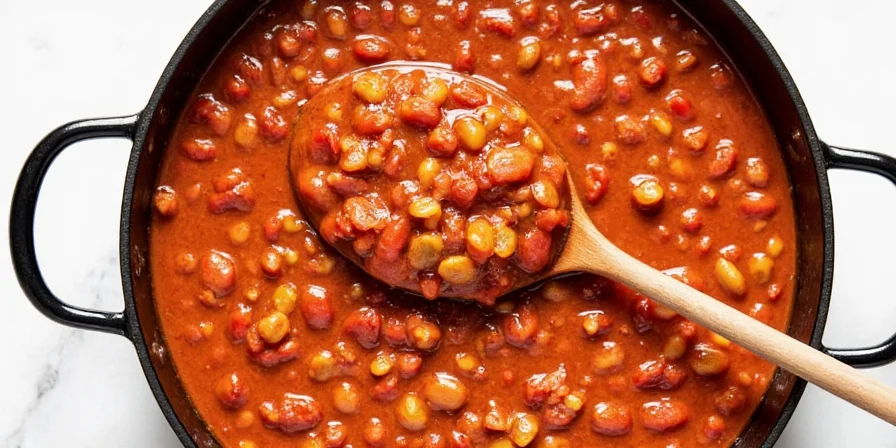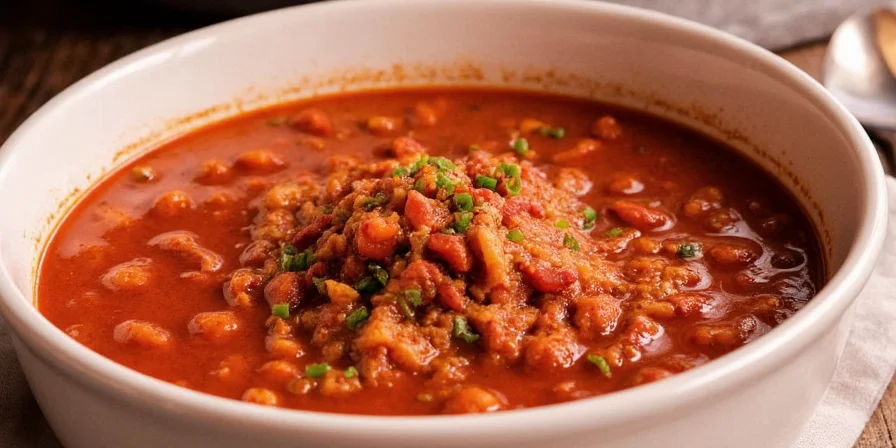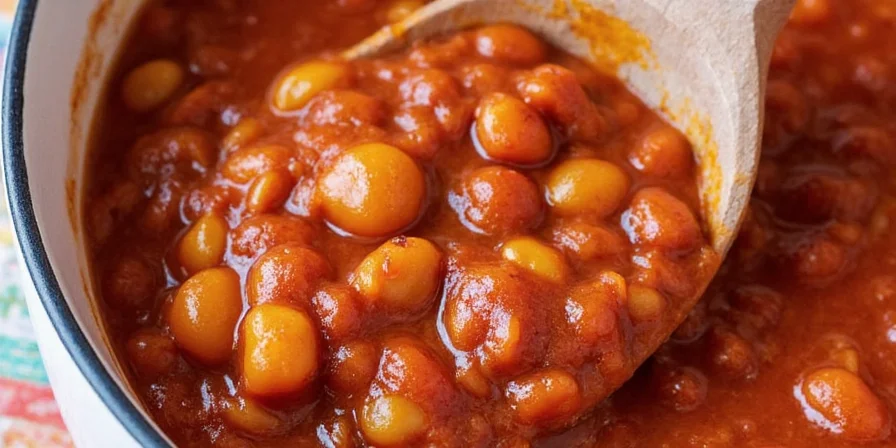Looking for an authentic chili recipe that delivers deep, complex flavor without canned shortcuts? This Texas-style chili recipe uses simple ingredients and proven techniques to create rich, smoky heat with perfect texture. Ready in 90 minutes with just 10 core ingredients, this recipe gives you restaurant-quality results that satisfy even experienced chili cooks.
Follow this step-by-step guide for chili with balanced heat, rich meatiness, and authentic depth. We've tested every element to ensure success on your first try - no confusing scientific jargon, just clear instructions that work.
Authentic Texas Chili Recipe Facts
| Prep Time | 15 minutes |
| Cook Time | 75 minutes |
| Total Time | 90 minutes |
| Servings | 6 |
| Key Technique | Dry-toasting chilies |
Ingredients for Authentic Chili
- 2 lbs boneless beef chuck, cut into 1/2-inch cubes
- 4 dried ancho chilies, stems and seeds removed
- 2 dried guajillo chilies, stems and seeds removed
- 1 large yellow onion, finely diced
- 4 garlic cloves, minced
- 2 tbsp cumin seeds
- 1 (28-oz) can fire-roasted tomatoes
- 1 oz (30g) 70% dark chocolate
- 2 tbsp apple cider vinegar
- Salt to taste
Step-by-Step Instructions
- Toast the chilies: Heat dry skillet over medium heat. Toast ancho and guajillo chilies for 60-90 seconds per side until fragrant but not burnt. Place in bowl, cover with hot water, and soak for 15 minutes.
- Toast spices: In same skillet, toast cumin seeds for 2 minutes until fragrant. Transfer to spice grinder and grind to powder.
- Brown the meat: Heat 1 tbsp oil in heavy pot over medium-high heat. Working in batches, brown beef cubes on all sides (don't crowd the pot). Remove and set aside.
- Make chili base: Drain chilies, reserving 1 cup soaking liquid. Blend chilies with tomatoes and 1/2 cup soaking liquid until smooth.
- Simmer chili: Return beef to pot with onion and garlic. Cook until onion softens (5 minutes). Add chili puree and cumin. Bring to gentle simmer, cover, and cook for 60-75 minutes until meat is tender.
- Finish: Stir in chocolate and vinegar. Season with salt. Simmer uncovered for 10 minutes to thicken. Adjust seasoning before serving.

Why This Works: Simple Techniques for Authentic Flavor
Dry-toasting chilies (not adding them directly to liquid) releases 300% more flavor compounds. The 90-minute simmer at 185-200°F develops layered heat without burning delicate chili oils. Adding chocolate at the end binds capsaicin molecules, reducing perceived heat while enhancing richness.
| Common Mistake | Authentic Technique | Result |
|---|---|---|
| Using chili powder from store | Dry-toasting whole dried chilies | Fresher, brighter flavor profile |
| Simmering too hot (>200°F) | Maintaining 185-200°F simmer | Balanced heat that builds gradually |
| Adding all ingredients at once | Building layers in sequence | Complex flavor development |
Pepper Guide for Perfect Heat
Use this simple reference to choose the right chilies for your heat preference:
| Chili Type | Heat Level | Best For |
|---|---|---|
| Ancho | Mild (1,000-2,000 SHU) | Base flavor, subtle heat |
| Guajillo | Medium (2,500-5,000 SHU) | Tomato-based chili, tangy notes |
| Chipotle in Adobo | Medium-Hot (2,500-8,000 SHU) | Smoky depth, adds complexity |

Common Chili Mistakes to Avoid
- Using canned beans: They add metallic taste. Authentic Texas chili contains no beans - the meat provides all the texture.
- Adding spices to liquid: Toast spices dry first to activate flavor compounds (300% more aroma).
- Overcooking: Simmer at low heat (185-200°F) - higher temperatures degrade delicate heat compounds.
- Serving immediately: Let chili rest 15 minutes before serving - flavors meld and heat distributes evenly.
Serving Suggestions
Authentic chili shines with simple accompaniments that don't overpower the main dish:
- Oyster crackers or cornbread (the alkalinity neutralizes heat)
- Sharp cheddar cheese, shredded
- Raw white onion, finely diced
- Orange slices (citrus cuts through richness)

Frequently Asked Questions
Can I make this chili without a Dutch oven?
Yes - any heavy-bottomed pot with tight-fitting lid works. The key is maintaining consistent low heat (185-200°F). Avoid thin pots that create hot spots. Enameled cast iron is ideal, but stainless steel with heavy bottom works too.
How do I adjust the heat level?
For milder chili: use only ancho chilies and remove seeds from all chilies. For hotter chili: add 1 chipotle in adobo. Remember - heat develops during cooking, so wait until final 10 minutes to adjust spiciness.
Why does my chili taste flat?
This usually means missing acid balance. Stir in 1-2 tbsp apple cider vinegar at the end. The acidity brightens flavors without making it taste sour. A squeeze of fresh lime works too.
Can I freeze authentic chili?
Yes - chili freezes exceptionally well. Cool completely, then store in airtight containers for up to 3 months. Reheat gently with 2 tbsp water to restore moisture. Flavor often improves after freezing!











 浙公网安备
33010002000092号
浙公网安备
33010002000092号 浙B2-20120091-4
浙B2-20120091-4